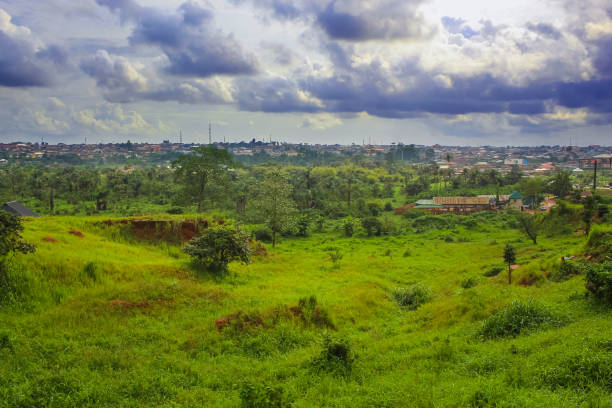
Some years ago, my uncle bought a piece of land in Ajah for just N500,000. It was one of those decisions people mocked him for. The place was bushy, waterlogged, and seemed far from civilisation. People said things like, “Who will live here? You for just buy farm land in the village.” Fast-forward to today, that same land is worth over N35 million. No major development on it, just time. He didn’t build anything; the only thing that changed was the neighbourhood—and of course, Lagos.
This isn’t a magic story. This is Lagos real estate.
In this article, we’ll unpack the reality behind land appreciation in Lagos—why plots once sold for peanuts now go for tens of millions. We’ll walk through the natural forces that push land value upward, the hidden power of location, and how investors quietly make generational wealth by doing something as simple (and as strategic) as waiting.
The Lagos Land Boom: How It All Began
Lagos didn’t become a hot cake overnight.
It was always Nigeria’s commercial nerve centre, but the rapid rise in population and urban migration has turned real estate into a goldmine. What started as a trickle of people moving from other states to Lagos for jobs eventually became a flood. As more people entered the city, the demand for housing increased—and so did the value of land.
But not all areas appreciated the same way or at the same speed.
Places like Victoria Island, Ikoyi, and Lekki Phase 1 shot up early. They were the early birds. But even further areas like Sangotedo, Awoyaya, Epe, and Ibeju-Lekki are now following the same pattern. Back in the early 2000s, some of these areas had land going for N200K to N500K. Today, some of them are priced at N15 million, N25 million, or even more.
That’s the story behind the phrase “From N500K to Millions: How Land in Lagos Appreciates Over Time.” It’s not hype—it’s simply Lagos catching up with itself.
The Invisible Hand Behind Price Increase
Let’s not assume land prices in Lagos rise just because everyone says they do. There are actual reasons. Lagos land appreciates because of infrastructure, location desirability, population growth, and demand.
When the Lagos State government announces a new road project or bridge—like the Lekki-Epe Expressway upgrade or the Fourth Mainland Bridge—land prices in those corridors automatically rise. Even before construction starts, speculators start buying, expecting future gains. It becomes a domino effect: private developers begin to invest, housing estates spring up, and then prices triple.
Also, the more Lagos becomes crowded at the centre, the more people are pushed outward. Ikeja, Surulere, and Yaba are saturated. That’s why places like Mowe (on the outskirts), Badagry, and Epe are now trending. Once people start settling there, value begins to shift.
Even economic policies can affect this. When the Dangote Refinery project was announced in Ibeju-Lekki, the land that was barely touching N600K suddenly started going for N10M within a few years.
Why? Investors knew workers, businesses, and logistics services would need to move closer. It’s the quiet magic of location transformation.
Real-Life Stories: The Waiters Win
Not everyone who made millions from Lagos land was rich or a big-time investor. In fact, many were just early buyers—people who had the patience to wait.
A woman once bought four plots in Epe for N400K each in 2014. Her intention wasn’t to build immediately. She just wanted to “hold land somewhere.” In 2024, she sold one plot for N18 million. No development, no fence. Just land. That one sale gave her over 40 times her initial investment on that plot alone. She still has three plots left.
This is the quiet revolution happening in Lagos. The longer you wait, the louder your return becomes. But the key is always entry timing and location sense. Not every land turns to gold. Some take longer than others. But the right ones almost always rise.
So when we say “From N500K to Millions: How Land in Lagos Appreciates Over Time,” we’re talking about this gradual, steady, powerful gain that rewards patience and insight.
The Misconceptions and the Traps
Now, let’s be honest—some people buy land and never make a profit. Why? Because they fall into traps.
Some buy land in areas with land disputes or no government-approved layout. Others buy where flooding, poor access, or lack of development keeps prices stagnant. There are also people who rush into estates that are too speculative or overpriced for the current state of the area.
Lagos can reward you heavily, but it can also waste your money if you don’t do proper due diligence. You must understand land titles (like C of O, Gazette, Excision), check accessibility, and consider proximity to known developments. Ask around. Get professional help.
The most common mistake? Impatience. Some people buy land and expect a flip in 12 months. It doesn’t always work like that. The big jumps often happen in 5, 10, or even 15 years. That’s why it’s called property holding—you literally hold until it matures.
How to Join the Next Wave
Here’s the good news: it’s not too late. There are still areas in Lagos today selling land between N500K and N5 million. Places like Ketu-Epe, Agbowa, and parts of Badagry are still in their early stages. If history is anything to go by, some of these places might be selling at N20 million in the next 10 years.
The window is still open—but it won’t be for long.
So if you’ve ever thought of getting land in Lagos, start where your pocket can reach. Don’t aim for Lekki if your budget can only do Epe. Don’t wait for millions before you act. Because land doesn’t wait. The same plot you’re pricing today will likely go up next year.
This is the Lagos formula: growth always creeps in quietly. It doesn’t make noise at first. Then one day, you hear someone say, “That land wey dem dey sell N500K that year? Now e don reach N25 million.” That’s when you realise—from N500K to millions wasn’t just a phrase. It was real-time wealth creation.
Conclusion
Real estate isn’t always fast money, but in Lagos, it can be sure money. The city is expanding in every direction. The roads, industries, and population are doing what they naturally do—grow. That growth means pressure on space. And pressure on space always makes land appreciate.
From N500K to Millions: How Land in Lagos Appreciates Over Time is not just a catchy title—it’s a proven pattern. It has happened in Festac, in Ajah, in Sangotedo, and it is already happening in Epe and Badagry.
The best time to buy land in Lagos was 10 years ago. The second-best time? Today. And if you’re thinking of where to start, well… Dennis Isong can help. I don’t just sell land—I show you where the next “miracle” is quietly starting.
Dennis Isong is a TOP REALTOR IN LAGOS.He Helps Nigerians in Diaspora to Own Property In Lagos Nigeria STRESS-FREE. For Questions WhatsApp/Call 2348164741041
